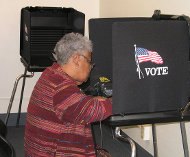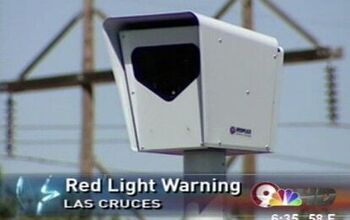Albuquerque, New Mexico Voters Reject Red Light Cameras
Voters in Albuquerque, New Mexico turned out in large numbers Tuesday to vote down the use of automated ticketing machines. Nearly 40,000 ballots were cast on an advisory question that City Councilor Dan Lewis placed before voters.
“Shall the Albuquerque City Council continue authorizing the ‘safe traffic operations program,’ commonly called the ‘red light camera program’?” the ballot asked.
With 94 percent of precincts reporting, 53 percent said “no” to the cameras. Unlike past referendum efforts, the city council created the ballot measure rather than citizen activists. As a result, there was no organized campaign urging people to vote down photo enforcement. On the other hand, Redflex Traffic Systems, the Australian company that runs the camera program in Albuquerque, put on an all-out effort to advertise in support of photo ticketing.
After Lewis announced he was going to file an ethics complaint against the Australian company for violating the city’s disclosure rules, Redflex quickly changed the name of its front group to state that it was “Paid for by Safe Roads Albuquerque Supported by Redflex Traffic Systems.” In April, Lewis threw his hat in the ring to run as a Republican for the congressional seat now held by Democrat Martin Heinrich.
The Redflex loss in Albuquerque does not bode well for the red light camera industry which faces upcoming referendum votes in three Ohio cities — Ashtabula, South Euclid and East Cleveland — and three Washington cities — Bellingham, Longview and Monroe. Later votes are likely in two California cities — Murrieta and Westminster — and two Texas cities — Dayton and Port Lavaca. A vote is also likely in Redmond, Washington.
No photo ticketing program has ever survived such a vote. During the 2010 midterms, voters in Houston and Baytown, Texas as well as Garfield Heights, Ohio rejected red light cameras. The vote in Mukilteo, Washington was 70 percent against the cameras and 73 percent in Anaheim, California. In May 2010, 61 percent of Sykesville, Maryland voters overturned a speed camera ordinance. In 2009, eighty-six percent of Sulphur, Louisiana rejected speed cameras. The November elections included three votes: 72 percent said no in Chillicothe, Ohio; Heath, Ohio and College Station, Texas also rejected cameras. In 2008, residents in Cincinnati, Ohio rejected red light cameras. Seventy-six percent of Steubenville, Ohio voters rejected photo radar in 2006. In the mid-1990s, speed cameras lost by a two-to-one margin in Peoria, Arizona and Batavia, Illinois. In 1997, voters in Anchorage, Alaska banned cameras even after the local authorities had removed them. In 2003, 64 percent of voters in Arlington, Texas voted down “traffic management cameras” that opponents at the time said could be converted into ticketing cameras.
[Courtesy: thenewspaper.com]
More by The Newspaper
Latest Car Reviews
Read moreLatest Product Reviews
Read moreRecent Comments
- Bd2 While Hyundai has enough models that offer a hybrid variant, problem has been inadequate supply, so this should help address that.In particular, US production of PHEVs will make them eligible for the tax credit.
- Zipper69 "At least Lincoln finally learned to do a better job of not appearing to have raided the Ford parts bin"But they differentiate by being bland and unadventurous and lacking a clear brand image.
- Zipper69 "The worry is that vehicles could collect and share Americans' data with the Chinese government"Presumably, via your cellphone connection? Does the average Joe in the gig economy really have "data" that will change the balance of power?
- Zipper69 Honda seem to have a comprehensive range of sedans that sell well.
- Oberkanone How long do I have to stay in this job before I get a golden parachute?I'd lower the price of the V-Series models. Improve the quality of interiors across the entire line. I'd add a sedan larger then CT5. I'd require a financial review of Celestiq. If it's not a profit center it's gone. Styling updates in the vision of the XLR to existing models. 2+2 sports coupe woutd be added. Performance in the class of AMG GT and Porsche 911 at a price just under $100k. EV models would NOT be subsidized by ICE revenue.


































Comments
Join the conversation
Good for Albuquerque although even if it had passed they wouldn't have been able to put the cameras very many places. The New Mexico Legislature passed a measure a few years back to forbid the use of red-light/speed cameras on any State Route, Highway, or Interstate. This limited quite a bit the places that one could be put in NM.
Dan, that may be true, but I remember reading a while ago about one or more California cities that were operating camera programs in violation of state law.